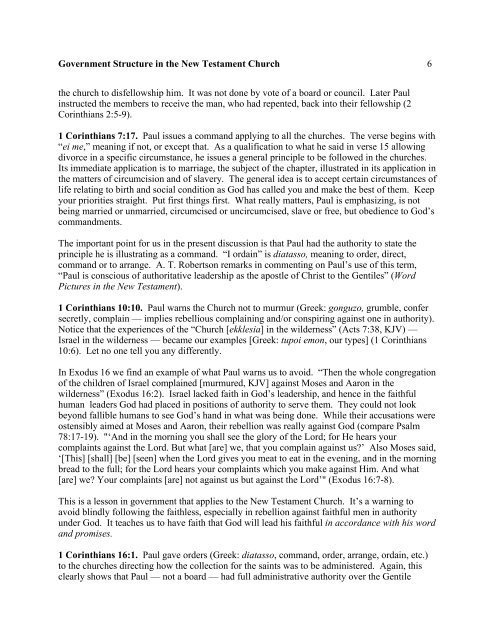Government Structure in the New Testament Church - Living Church ...
Government Structure in the New Testament Church - Living Church ...
Government Structure in the New Testament Church - Living Church ...
Create successful ePaper yourself
Turn your PDF publications into a flip-book with our unique Google optimized e-Paper software.
<strong>Government</strong> <strong>Structure</strong> <strong>in</strong> <strong>the</strong> <strong>New</strong> <strong>Testament</strong> <strong>Church</strong> 6<br />
<strong>the</strong> church to disfellowship him. It was not done by vote of a board or council. Later Paul<br />
<strong>in</strong>structed <strong>the</strong> members to receive <strong>the</strong> man, who had repented, back <strong>in</strong>to <strong>the</strong>ir fellowship (2<br />
Cor<strong>in</strong>thians 2:5-9).<br />
1 Cor<strong>in</strong>thians 7:17. Paul issues a command apply<strong>in</strong>g to all <strong>the</strong> churches. The verse beg<strong>in</strong>s with<br />
“ei me,” mean<strong>in</strong>g if not, or except that. As a qualification to what he said <strong>in</strong> verse 15 allow<strong>in</strong>g<br />
divorce <strong>in</strong> a specific circumstance, he issues a general pr<strong>in</strong>ciple to be followed <strong>in</strong> <strong>the</strong> churches.<br />
Its immediate application is to marriage, <strong>the</strong> subject of <strong>the</strong> chapter, illustrated <strong>in</strong> its application <strong>in</strong><br />
<strong>the</strong> matters of circumcision and of slavery. The general idea is to accept certa<strong>in</strong> circumstances of<br />
life relat<strong>in</strong>g to birth and social condition as God has called you and make <strong>the</strong> best of <strong>the</strong>m. Keep<br />
your priorities straight. Put first th<strong>in</strong>gs first. What really matters, Paul is emphasiz<strong>in</strong>g, is not<br />
be<strong>in</strong>g married or unmarried, circumcised or uncircumcised, slave or free, but obedience to God’s<br />
commandments.<br />
The important po<strong>in</strong>t for us <strong>in</strong> <strong>the</strong> present discussion is that Paul had <strong>the</strong> authority to state <strong>the</strong><br />
pr<strong>in</strong>ciple he is illustrat<strong>in</strong>g as a command. “I orda<strong>in</strong>” is diatasso, mean<strong>in</strong>g to order, direct,<br />
command or to arrange. A. T. Robertson remarks <strong>in</strong> comment<strong>in</strong>g on Paul’s use of this term,<br />
“Paul is conscious of authoritative leadership as <strong>the</strong> apostle of Christ to <strong>the</strong> Gentiles” (Word<br />
Pictures <strong>in</strong> <strong>the</strong> <strong>New</strong> <strong>Testament</strong>).<br />
1 Cor<strong>in</strong>thians 10:10. Paul warns <strong>the</strong> <strong>Church</strong> not to murmur (Greek: gonguzo, grumble, confer<br />
secretly, compla<strong>in</strong> — implies rebellious compla<strong>in</strong><strong>in</strong>g and/or conspir<strong>in</strong>g aga<strong>in</strong>st one <strong>in</strong> authority).<br />
Notice that <strong>the</strong> experiences of <strong>the</strong> “<strong>Church</strong> [ekklesia] <strong>in</strong> <strong>the</strong> wilderness” (Acts 7:38, KJV) —<br />
Israel <strong>in</strong> <strong>the</strong> wilderness — became our examples [Greek: tupoi emon, our types] (1 Cor<strong>in</strong>thians<br />
10:6). Let no one tell you any differently.<br />
In Exodus 16 we f<strong>in</strong>d an example of what Paul warns us to avoid. “Then <strong>the</strong> whole congregation<br />
of <strong>the</strong> children of Israel compla<strong>in</strong>ed [murmured, KJV] aga<strong>in</strong>st Moses and Aaron <strong>in</strong> <strong>the</strong><br />
wilderness” (Exodus 16:2). Israel lacked faith <strong>in</strong> God’s leadership, and hence <strong>in</strong> <strong>the</strong> faithful<br />
human leaders God had placed <strong>in</strong> positions of authority to serve <strong>the</strong>m. They could not look<br />
beyond fallible humans to see God’s hand <strong>in</strong> what was be<strong>in</strong>g done. While <strong>the</strong>ir accusations were<br />
ostensibly aimed at Moses and Aaron, <strong>the</strong>ir rebellion was really aga<strong>in</strong>st God (compare Psalm<br />
78:17-19). "‘And <strong>in</strong> <strong>the</strong> morn<strong>in</strong>g you shall see <strong>the</strong> glory of <strong>the</strong> Lord; for He hears your<br />
compla<strong>in</strong>ts aga<strong>in</strong>st <strong>the</strong> Lord. But what [are] we, that you compla<strong>in</strong> aga<strong>in</strong>st us?’ Also Moses said,<br />
‘[This] [shall] [be] [seen] when <strong>the</strong> Lord gives you meat to eat <strong>in</strong> <strong>the</strong> even<strong>in</strong>g, and <strong>in</strong> <strong>the</strong> morn<strong>in</strong>g<br />
bread to <strong>the</strong> full; for <strong>the</strong> Lord hears your compla<strong>in</strong>ts which you make aga<strong>in</strong>st Him. And what<br />
[are] we? Your compla<strong>in</strong>ts [are] not aga<strong>in</strong>st us but aga<strong>in</strong>st <strong>the</strong> Lord’" (Exodus 16:7-8).<br />
This is a lesson <strong>in</strong> government that applies to <strong>the</strong> <strong>New</strong> <strong>Testament</strong> <strong>Church</strong>. It’s a warn<strong>in</strong>g to<br />
avoid bl<strong>in</strong>dly follow<strong>in</strong>g <strong>the</strong> faithless, especially <strong>in</strong> rebellion aga<strong>in</strong>st faithful men <strong>in</strong> authority<br />
under God. It teaches us to have faith that God will lead his faithful <strong>in</strong> accordance with his word<br />
and promises.<br />
1 Cor<strong>in</strong>thians 16:1. Paul gave orders (Greek: diatasso, command, order, arrange, orda<strong>in</strong>, etc.)<br />
to <strong>the</strong> churches direct<strong>in</strong>g how <strong>the</strong> collection for <strong>the</strong> sa<strong>in</strong>ts was to be adm<strong>in</strong>istered. Aga<strong>in</strong>, this<br />
clearly shows that Paul — not a board — had full adm<strong>in</strong>istrative authority over <strong>the</strong> Gentile





